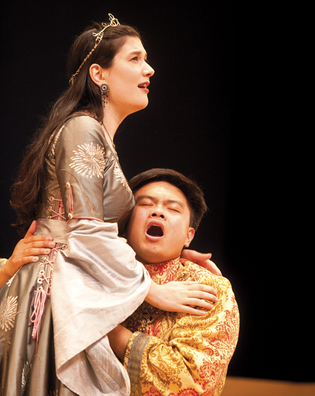 loading
loading
featuresThe highly unlikely opera companyA full-scale opera sung mostly by undergrads—and reviewed in the New York Times? This is not your average student production.  Mark OstowAt the end of the opera, in an emotional reunion, Penelope and Ulisse sing their final duet: "Let all past suffering flee from our hearts; yes, yes, my life, yes, yes." View full image
The king of Ithaca, brought ashore on a raft, staggers to his feet to stand on his own land after 20 years of war and wandering. At the palace, his lonely queen fends off demanding suitors who tell her he’s dead. For two and a half hours, these two will grieve, scheme, struggle, and finally reunite in joy—all of it in song, for this isn’t the Odyssey itself; it’s a 1640 opera by Claudio Monteverdi, based on the Odyssey’s ending. Appropriately for Homer’s epic, the journey to the stage has been a story of transformation, wonder, unlikely collaborations, and how to prepare for the unexpected. Full productions of Baroque operas—operas of the seventeenth and eighteenth centuries, precursors to opera as we recognize it today—are rare, but Yale has been staging one a year for the past five years. Still more unusual is the fact that Yale’s singers aren’t professional early-music performers, or even, for the most part, music students: every year, all but one or two have been undergraduates. (This year’s cast included a political science major, a math major, and, as the warrior-mastermind Ulysses, a future medical student.) Yet the New York Times’chief classical music critic called their performance—Il ritorno d’Ulisse in patria, presented at the University Theatre in early May—“well prepared,” “historically informed,” and “engaging.” A 2009 performance of a Franceso Cavalli work, according to the New Yorker, “came off beautifully.” How do college students pull off the sort of performance that lands kind reviews in elite publications? “It’s very different from senior projects,” explains Terrence Chin-Loy ’14, who played one of Penelope’s suitors, “in that there’s a professional production team.” That, and more. The singers were chosen from more than 40 students who auditioned at the start of the fall semester. Their selection admitted them not just to a show but also to a related spring course, Music 322: Analyzing, Directing, and Performing Early Opera. Every Baroque opera production is the end product of that class. Toni Dorfman of the theater studies program oversees the dramatic staging; Grant Herreid, a lecturer in the music department, brings it to life as a work of music. They teach Music 322 together. Homework this year, Dorfman says, included “reading the Odyssey, reading Petrarch’s sonnets, reading on gestures and expression in Monteverdi,” and setting a poem to music in Monteverdi’s style. The students also memorize their lines—for some, hundreds of lines—in Italian. And they receive copious individual coaching, with Herreid teaching them how to sing and shape their parts and Dorfman how to move onstage and act their roles. Music 322 is part of the Yale Baroque Opera Project, which also arranges for everything else an opera needs: costumers, choreography, lighting, stage managers, set design, and musicians, for a start. The project exists through a wild blend of talent and resources from Yale’s Department of Music, undergraduate theater studies program, School of Music, and Whitney Humanities Center, as well as alumni associates and a troop of outside professionals. The impresario and visionary who pulled them all together is music professor Ellen Rosand. Rosand, who as executive director of the project has a say in every aspect of its productions and classwork, has been involved in a number of Baroque opera stagings, but usually as an editor or consultant—“not like this.” Baroque opera has been her field of study, she says, “forever.” A world authority in sixteenth- through eighteenth-century Italian music and poetry, she received a Distinguished Achievement Award from the Mellon Foundation in 2007 and used it, in part, to found the project. It is a highly unusual undertaking. According to Rosand, no other college curriculum includes a Baroque opera program. (It’s expensive: about $200,000 a year. The Mellon grant runs out next year, but Rosand hopes to raise more funds.) Why undergrads? After all, Yale’s School of Music, a leading US conservatory, has an opera program whose alumni can be heard in all the great opera companies of the world. But Rosand says her aim—cultural and academic, not career-focused—is best suited to undergrads. Music students have to practice and prepare for their careers; college students want to read the Odyssey and Petrarch. And although most operas are too demanding for young voices, operas of the seventeenth century are less vocally virtuosic. Rosand believes putting on an opera is also a good way for an undergraduate to “learn what high professionalism is.” That includes high professionalism in the face of adversity. The night before the first performance of Il ritorno, one singer was out with the flu, and the swordfights still needed fine-tuning. But it all came together. And if the Times found it engaging, for the students, it was much more. “It has definitely been one of my fondest, most amazing experiences at Yale,” says Terrence Chin-Loy.
The comment period has expired.
|
|